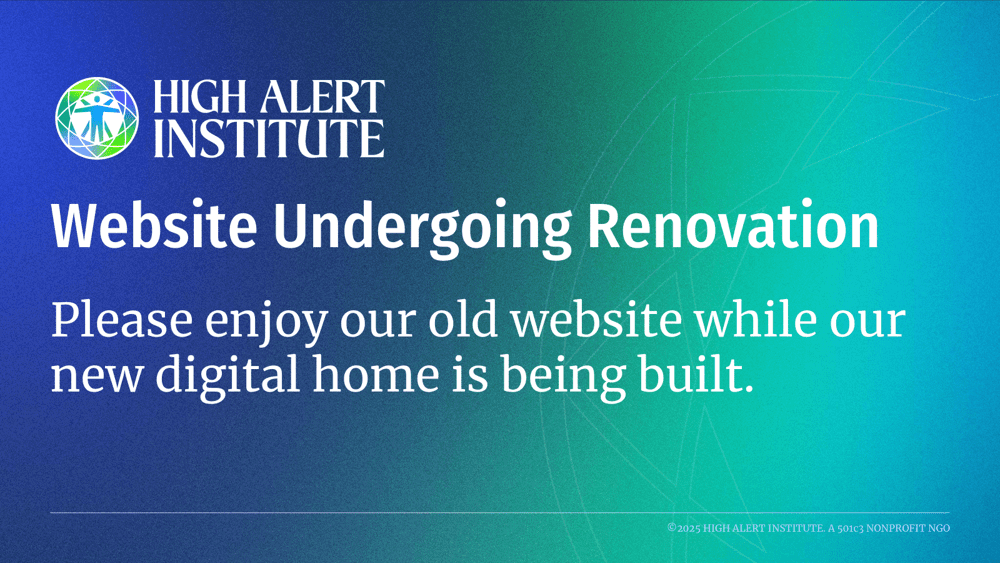High Alert Institute
The ONE Thing I Have Done to Book More Business

When I was offered the honor of contributing my “ONE Thing” in an effort to help new and growing Professional Speakers book more business I knew immediately what to say. Now I am sure that this is neither an original thought, nor even an original way of phrasing it:
“Feed you business and your business will feed you!”
The trick is what to feed your business. Many authors, speakers and consultants will tell you to feed your business money, lots of money. I’ve made this mistake and urge you to learn from my error. While money is needed to start a new business and make a business grow, undirected money is NOT the food your business needs.
Similarly, I have heard and read many claim that time is the critical element that feeds your speaking career. I’ve spent countless hours doing things I am really bad at because those more successful have told me that if I only spend more time making cold calls or selling product I’ll “get better at it.” I never did.
Over the years and 2 careers spanning over 20 years, I learned that you feed your business like you feed yourself. You feed your business a balanced diet from the 4 business food groups:
Education
Public Relations
Marketing
Advertising
Many of you are wondering how I get four groups out of what most business owners see as two spending categories. Let me assure you, these MUST be 4 spending accounts in your ledger, if not you’ll have an empty calendar and an empty bank account.
Education:
The concept of the highly educated Professional Speaker is not new. “Education to the Power of Eloquence” was the Nationals Speakers Association (NSA) theme in 2003-2004. “Education through Eloquence – Eloquence through Education” is my company’s catch phrase, but education is so much more than course work and technical expertise. Education includes investing in mentoring for you and being a mentor to others. It also includes becoming a member of your Professional Associations.
Public Relations:
When it comes to Public Relations (PR), Marketing and Advertising, the situation becomes a little more complex. The first problem is that in most small business owner’s minds, these are synonymous terms. THEY ARE NOT.
“Public Relations” is the establishment of you and your company as THE recognized expert within a specific demographic, geographic and/or professional group. This is also known as “Branding.” Thus Public Relations is the process of Branding. At this stage, it is almost irrelevant what your PR says as long as it positions you as the expert’s expert.
“Marketing” is association of your established brand with products and or services in the mind of a particular person, demographic, geographic and/or professional group. A “market” is that identifiable person, demographic, geographic and/or professional group. While Public Relations is the process of “Branding,” Marketing is the process of “establishing the Brand.”
“Advertising” is the establishment of a sense of need for a product or service in the mind of you market. Even if your market knows your name (brand) and your products/services, if they do not know that they need your products or services, they will never buy! On the other hand, if they “feel the need” and you have established your brand, they will seek you out.
Applying Business Triage principles, you can identify and concentrate on those who most need your services and space.
The first step in each of these triage techniques is to identify and categorize your desired outcomes based:
– Critical/Essential Outcomes – Those that must occur to meet the overall financial or service mission
– Urgent/Important Outcomes – Those that facilitate the overall financial or service mission, but are not essential to that mission.
– Supportive/Optional Outcomes – Those that facilitate the overall financial or service mission, but are ancillary and thus not necessary to the mission.
Once the outcomes are classified into these categories, you must identify the processes that result in the desired outcomes.
Once the processes are identified, they too must be categorized:
– Critical/Essential Processes – Those that must be supported to meet the desired outcome
– Urgent/Important Processes – Those that facilitate the desired outcome, but are not essential to meeting the desired outcome.
– Supportive/Optional Processes – Those that facilitate the desired outcome, but are ancillary and thus not necessary to meeting the desired mission.
Next the resources needed for each process are identified and categorized:
– Critical/Essential Resources – Those essential to the process and without which the process will fail
– Urgent/Important Resources – Those that facilitate the process, but are not essential to the process.
– Supportive/Optional Resources – Those that facilitate the process, but are ancillary to the process and the absence of the resource will not affect the efficiency of the process.
Graphically:
| Critical/Essential Outcomes | ||
| Critical/Essential Processes | Urgent/Important Processes | Supportive/Optional Processes |
| Critical/Essential Resources
Urgent/Important Resources Supportive/Optional Resources |
Critical/Essential Resources
Urgent/Important Resources Supportive/Optional Resources |
Critical/Essential Resources
Urgent/Important Resources Supportive/Optional Resources |
| Urgent/Important Outcomes | ||
| Critical/Essential Processes | Urgent/Important Processes | Supportive/Optional Processes |
| Critical/Essential Resources
Urgent/Important Resources Supportive/Optional Resources |
Critical/Essential Resources
Urgent/Important Resources Supportive/Optional Resources |
Critical/Essential Resources
Urgent/Important Resources Supportive/Optional Resources |
| Supportive/Optional Outcomes | ||
| Critical/Essential Processes | Urgent/Important Processes | Supportive/Optional Processes |
| Critical/Essential Resources
Urgent/Important Resources Supportive/Optional Resources |
Critical/Essential Resources
Urgent/Important Resources Supportive/Optional Resources |
Critical/Essential Resources
Urgent/Important Resources Supportive/Optional Resources |
Essential/Critical Outcomes are fully supported first with all available resources, then Urgent/Important and finally Supportive/Optional.
Anyone who wants to increase their profits will get great results if the just remember:
Feed your business and your business will feed you!
High Alert Institute
4800 Ben Hill Trail
Lake Wales, FL 33898
Office: 863.696.8090
FAX: 407.434.0804
EIN: 27-5078437
Info@HighAlertInstitute.org
Privacy Policy
Cookie Policy
Terms of Use
Disclaimers
Get Your Data
Shipping Policy
Message Us
Transparency
Registrations
Do Not Sell Info
Return Policy
A COPY OF THE OFFICIAL REGISTRATION AND FINANCIAL INFORMATION MAY BE OBTAINED FROM THE DIVISION OF CONSUMER SERVICES BY CALLING TOLL-FREE, WITHIN THE STATE, 1-800-435-7352 (800-HELP-FLA), OR VISITING www.FloridaConsumerHelp.com. REGISTRATION DOES NOT IMPLY ENDORSEMENT, APPROVAL, OR RECOMMENDATION BY THE STATE. Florida Registration #CH68959
REGISTRATION WITH A STATE AGENCY DOES NOT CONSTITUTE OR IMPLY ENDORSEMENT, APPROVAL OR RECOMMENDATION BY THAT STATE.










